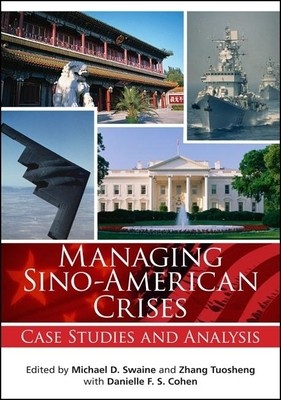
- We will send in 10–14 business days.
- Publisher: Carnegie Endowment for International Peace
- ISBN-10: 0870032283
- ISBN-13: 9780870032288
- Format: 16 x 22.8 x 2.9 cm, minkšti viršeliai
- Language: English
- SAVE -10% with code: EXTRA
Managing Sino-American Crises (e-book) (used book) | bookbook.eu
Reviews
Description
The Taiwan Strait. The Korean War. Vietnam. The bombing of the Chinese Embassy in Belgrade. The Sino-U.S. aircraft collision incident. U.S.-China relations have witnessed significant tensions and conflict over the years. Sensitivities and suspicions between Washington and Beijing have heightened as China's global power and influence have grown. Arguably, this new international order could increase the chances of a political-military crisis--or perhaps outright conflict--between the two powers. Managing Sino-American Crises brings together Chinese and American officials and participants in past confrontations, as well as scholars from both countries, to explore the changing features of crisis behavior and their implications for defusing future encounters. Using both conceptual analysis and historical case studies, this authoritative volume identifies specific problems and opportunities that will likely confront both countries in the future. The authors propose recommendations that will improve the effectiveness of U.S.-China crisis management skills. Contributors include Wang Jisi (Peking University), Zhang Baijia (Central Committee of the Chinese Communist Party), Richard Weitz (Hudson Institute), Robert L. Suettinger (Technology, Inc.), Dennis C. Blair (Institute for Defense Analyses), David V. Bonfili (Institute for Defense Analyses), Xu Hui (National Defense University), Kurt M. Campbell (Center for Strategic and International Studies), Jonathan Wilkenfeld (University of Maryland), Xia Liping (Shanghai Institute for International Studies), Allen S. Whiting (University of Arizona), Wu Baiyi (Chinese Academy of Social Sciences), Niu Jun (Peking University), and Zhang Tuosheng (China Foundation for International and Strategic Studies).
EXTRA 10 % discount with code: EXTRA
The promotion ends in 22d.20:16:30
The discount code is valid when purchasing from 10 €. Discounts do not stack.
- Publisher: Carnegie Endowment for International Peace
- ISBN-10: 0870032283
- ISBN-13: 9780870032288
- Format: 16 x 22.8 x 2.9 cm, minkšti viršeliai
- Language: English English
The Taiwan Strait. The Korean War. Vietnam. The bombing of the Chinese Embassy in Belgrade. The Sino-U.S. aircraft collision incident. U.S.-China relations have witnessed significant tensions and conflict over the years. Sensitivities and suspicions between Washington and Beijing have heightened as China's global power and influence have grown. Arguably, this new international order could increase the chances of a political-military crisis--or perhaps outright conflict--between the two powers. Managing Sino-American Crises brings together Chinese and American officials and participants in past confrontations, as well as scholars from both countries, to explore the changing features of crisis behavior and their implications for defusing future encounters. Using both conceptual analysis and historical case studies, this authoritative volume identifies specific problems and opportunities that will likely confront both countries in the future. The authors propose recommendations that will improve the effectiveness of U.S.-China crisis management skills. Contributors include Wang Jisi (Peking University), Zhang Baijia (Central Committee of the Chinese Communist Party), Richard Weitz (Hudson Institute), Robert L. Suettinger (Technology, Inc.), Dennis C. Blair (Institute for Defense Analyses), David V. Bonfili (Institute for Defense Analyses), Xu Hui (National Defense University), Kurt M. Campbell (Center for Strategic and International Studies), Jonathan Wilkenfeld (University of Maryland), Xia Liping (Shanghai Institute for International Studies), Allen S. Whiting (University of Arizona), Wu Baiyi (Chinese Academy of Social Sciences), Niu Jun (Peking University), and Zhang Tuosheng (China Foundation for International and Strategic Studies).


Reviews